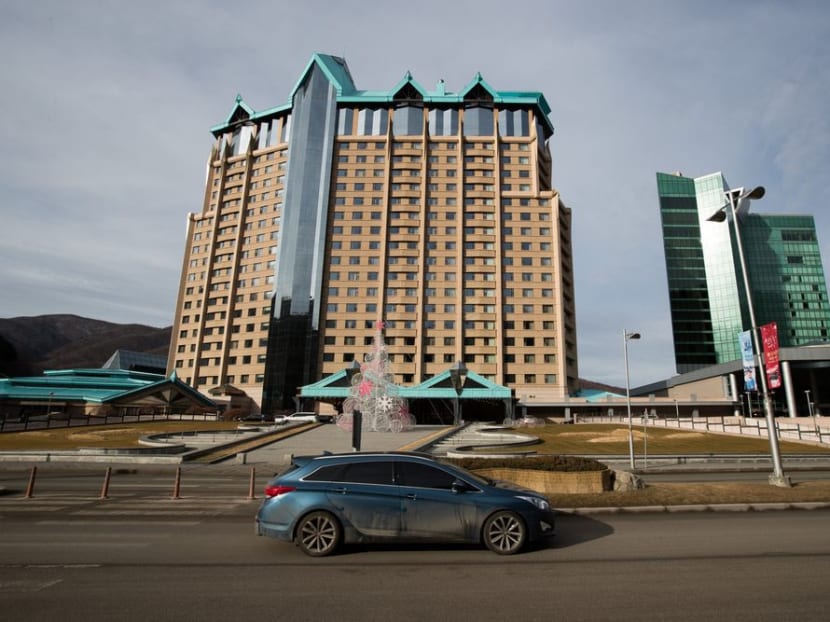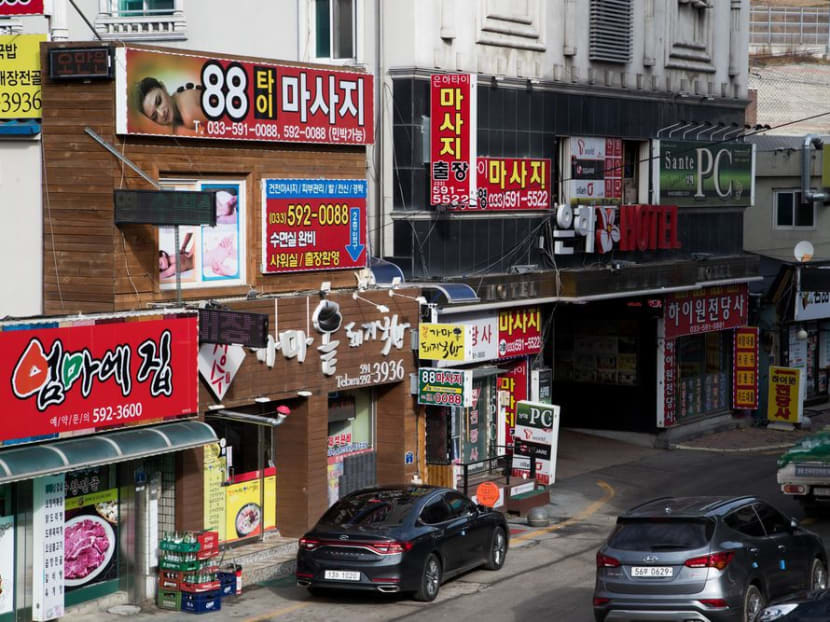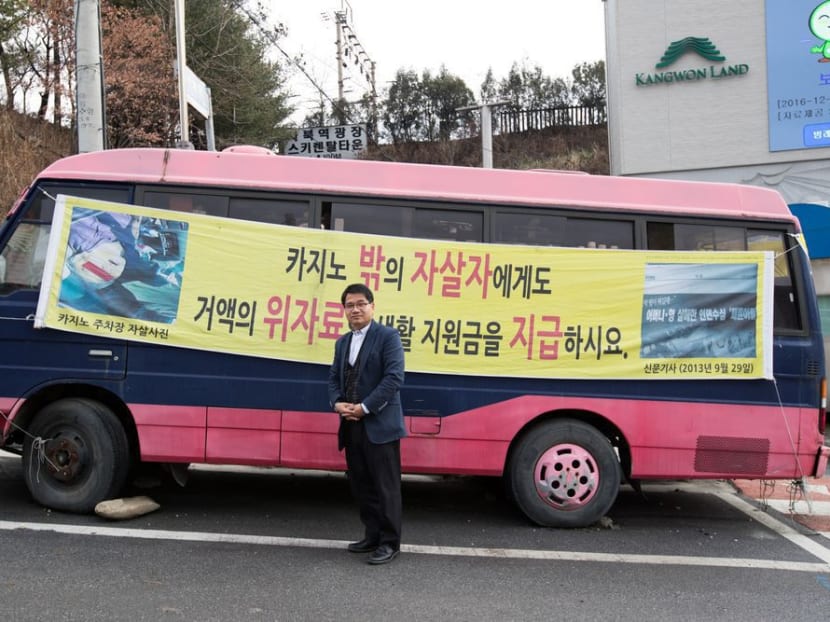Pawnshops, brothels and homelessness blight Korean casino town
SABUK (South Korea) — Four years ago, Mr Kim Jong-gu went to the South Korean mountain town of Sabuk to find out why his thirty-something daughter kept asking him for money.



SABUK (South Korea) — Four years ago, Mr Kim Jong-gu went to the South Korean mountain town of Sabuk to find out why his thirty-something daughter kept asking him for money.
“When I found her at the casino, she was laden with debt from loan sharks,” Mr Kim said, recalling his visit to Kangwon Land, the only casino of 17 in the nation open to Koreans.
Soon Mr Kim himself became hooked on gambling, racking up losses of some 180 million won (about S$218,500). Realising he no longer had a home to return to, he decided — at the age of 77 — to accept government subsidies provided to those who promise to kick the habit. He’s now living in a US$200-a-month (S$286-a-month) apartment in the town.
The proliferation of gambling addicts in Sabuk is serving as a warning for lawmakers in South Korea — and more recently Japan — enticed by the potential for tax revenues and economic gains. While Kangwon Land has brought jobs to the former coal-mining town, it’s also brought social ills in an area that has a suicide rate that’s twice the national average.
The casino opened at the turn of the century in a bid to revive the fortunes of Sabuk. The collapse of the mining industry took a heavy toll, with the town’s population slumping to about 5,500 from 50,000 in its 1980s heyday.
While the resort has brought jobs, the seedier elements pose challenges for lawmakers looking at opening a second resort for locals on South Korea’s west coast. Sabuk is littered with pawnshops and brothels, and telephone poles are plastered with ads for loan sharks.
CASINO OPERATOR
Mr Ham Seung-huie, the chief executive of Kangwon Land, defended the casino in a phone interview. He said it makes a positive contribution to the economy, providing highly paid jobs to high school dropouts.
“Without these jobs, this town would be devastated,” he said.
Mr Ham said that while there are likely “hundreds” of long-term gambling addicts in Sabuk, the casino is the “only one on Earth that limits the number of times a gamer can enter and we’re planning to strengthen the rule further from this year”.
Gamblers who spend 15 days a month at the casino for two straight months can come back after taking classes on addiction problems, he said. From April, they’ll be banned in the third month. “Kangwon Land is a state-owned company and we can’t just leave these addicts out without making any efforts to heal them,” Mr Ham said.
Mr Kim Kwan-young, a lawmaker with the opposition People’s Party, introduced a bill in August to open a second casino for Korean nationals. He sees “enormous” economic benefits because part of the 3 trillion won that he said Koreans spend on gambling overseas would return to the country.
“We can do better if we have stricter rules to prevent addiction,” Mr Kim said, citing the example of Singapore’s Marina Bay Sands resort.
But he has a fight on his hands. The Ministry of Culture, Sports and Tourism, which oversees casino policy, opposes the opening of a second resort for Koreans. Mr Kim Hong-pil, a director at the ministry’s international tourism division, points to gambling addiction and the breakup of families.
In Japan, where lawmakers just passed a law legalising casinos, opponents cite similar concerns as debate heads up over a second required piece of legislation on regulations for gambling resorts. TV news shows and some lawmakers in Tokyo are using Kangwon Land as an example of the harmful effects of allowing locals to gamble.
International gaming companies including MGM Resorts International and Las Vegas Sands have been mulling investments in Japan amid a boom in tourism, particularly from China. Opening two integrated resorts in major population centres could bring in US$10 billion in revenue, with potential for US$30 billion if they spread across the country, according to a report by CLSA in December.
CASINO ‘PANHANDLERS’
Some 12,000 people go to Kangwon Land more than 50 days a year, with about 2,000 gambling more than 100 days, the resort operator said. Around 500 people in the town are homeless casino addicts, according to the resort.
A typical “casino panhandler” is a male in his fifties from Seoul who has stayed in Sabuk longer than three years because he has nowhere to return after losing between 500 million won and 1 billion won, according to a survey last year by Catholic Kwandong University of 300 casino addicts staying in the area.
The state-run Korea Centre on Gambling Problems runs a branch near Sabuk to help rehabilitate addicts and provide them with what they need to endure the mountainous area’s frigid weather. In return, they promise to stop gambling.
Inside the casino, flashing lights and a lack of windows make it hard to tell if it’s night or day. Bleary eyed gamblers — mostly in their 40s or 50s — yawn as they plow chips into the 1,360 machines or place bets on the 200 tables at the resort. In casual hiking clothes and sandals, they light up in smoking booths dotted throughout the premises and chew gum to help stay awake.
The casino is open from 10am to 6am, and admission is 9,000 won (cash only). During closing hours the addicts go back to their temporary homes to sleep.
On the road into the resort, visitors are greeted by a sign showing a dead body being carried by mini-bus. This marks the location of a shelter set up more than a decade ago by a pastor who saw how addiction caused families to break up and led to frequent suicide attempts.
“Several times I rescued addicts who called me at the last minute before killing themselves,” said 58-year-old pastor Bang Eun-keun. “Still, it’s extremely hard to stop them from returning to the casino if they manage to get money.”
Data from the provincial health centre shows the suicide rate in Jeongseon county was 47.2 for every 100,000 people — nearly double the national average of 23.9 nationwide in 2014. Kim Hyo-yeol, a senior manager in Kangwon Land’s public relations team, said that the suicide rate in Gangwon Province is higher than the national average, and the county is in line with that.
TAX REVENUE
The government has few incentives to shut the casino down. In 2015, Kangwon Land contributed 615 billion won in tax revenue and payments to central and local government coffers as well as a government-run fund to develop the regional economy. That compares with a combined 299 billion won from the 16 casinos that only permit foreigners.
According to Mr Lee Hoon, a lawmaker with the main opposition Democratic Party of Korea, Kangwon Land has brought in more than 6 trillion won in tax revenue since it opened. It also provides most of the jobs in the town.
Even so, Mr Kim Chang-wan, a former miner who now runs a rehabilitation centre for addicts — operated by Kangwon Land — said it’s devastating to see addicts change the atmosphere of the town.
“Over the past three years, we’ve seen many government officials, mostly from Japan, visit us to ask about our problems,” Mr Kim said. “I constantly deliver the same message that they should avoid casinos for residents if they have other options.” BLOOMBERG






